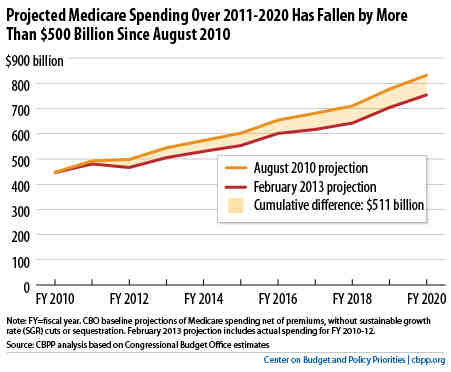BEYOND THE NUMBERS
Here’s some good news on the fiscal front: projected Medicare spending over the 2011-2020 period has fallen by more than $500 billion since late 2010 — based on a comparison of the latest Congressional Budget Office (CBO) projections with those of August 2010.
That’s important to remember because it was in late 2010 — and based on CBO’s August 2010 projections — when Fiscal Commission co-chairs Erskine Bowles and Alan Simpson issued their original budget proposal, calling for slightly more than $300 billion in Medicare spending cuts through 2020. The original Bowles-Simpson proposal is often considered an appropriate starting point in evaluating whether other deficit-reduction proposals should be viewed as responsible approaches to the deficit problem.
The figure below compares CBO’s August 2010 projection with its new one. We exclude both the deep cut in physician fees required by Medicare’s sustainable growth rate (SGR) formula and also the impending budget cuts known as sequestration. The resulting Medicare baseline projections are consistent with each other and with the baselines used by other budget analysts, such as Bowles-Simpson, the Bipartisan Policy Center, and the Committee for a Responsible Federal Budget.
CBO has reduced its projections of Medicare spending in response to a pattern of very low spending growth in the past three years. Medicare spending per beneficiary in fiscal year 2012 increased by only 0.4 percent — well below the 3.4-percent growth in gross domestic product (GDP) per capita. Over the 2010-2012 period, Medicare spending per beneficiary grew at an annual rate of 1.9 percent, while GDP per capita increased by 3.2 percent a year. CBO projects that Medicare cost growth will remain subdued for the rest of the decade.
Medicare spending growth has slowed even more than costs in private health insurance, according to Standard & Poor’s and Medicare’s actuary Although some of the slowdown stems from the recession, CBO Director Douglas Elmendorf and other experts have concluded that a substantial part reflects structural changes in the health care system. Professional associations, hospitals, and doctors are taking steps to curb costly and ineffective procedures and treatment.
No one knows how long this good news will continue, but even if cost growth remains moderate, Medicare spending will keep rising as more baby boomers become eligible for benefits. Making the U.S. health care system more efficient thus remains our biggest budget challenge. Yet the recent spending data and CBO’s new projections belie claims that policymakers must radically restructure Medicare to put it on a sound financial footing.

